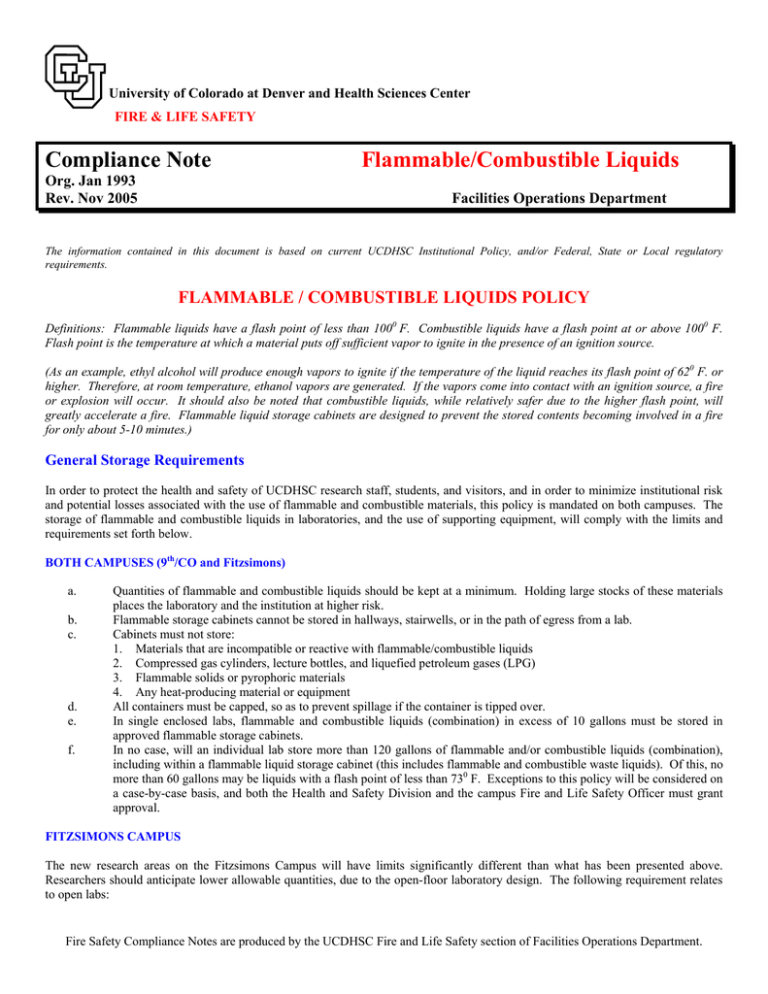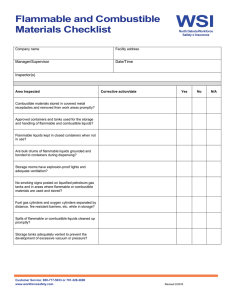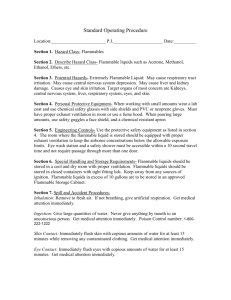Compliance Note Flammable/Combustible Liquids
advertisement

University of Colorado at Denver and Health Sciences Center FIRE & LIFE SAFETY Compliance Note Org. Jan 1993 Rev. Nov 2005 Flammable/Combustible Liquids Facilities Operations Department The information contained in this document is based on current UCDHSC Institutional Policy, and/or Federal, State or Local regulatory requirements. FLAMMABLE / COMBUSTIBLE LIQUIDS POLICY Definitions: Flammable liquids have a flash point of less than 1000 F. Combustible liquids have a flash point at or above 1000 F. Flash point is the temperature at which a material puts off sufficient vapor to ignite in the presence of an ignition source. (As an example, ethyl alcohol will produce enough vapors to ignite if the temperature of the liquid reaches its flash point of 620 F. or higher. Therefore, at room temperature, ethanol vapors are generated. If the vapors come into contact with an ignition source, a fire or explosion will occur. It should also be noted that combustible liquids, while relatively safer due to the higher flash point, will greatly accelerate a fire. Flammable liquid storage cabinets are designed to prevent the stored contents becoming involved in a fire for only about 5-10 minutes.) General Storage Requirements In order to protect the health and safety of UCDHSC research staff, students, and visitors, and in order to minimize institutional risk and potential losses associated with the use of flammable and combustible materials, this policy is mandated on both campuses. The storage of flammable and combustible liquids in laboratories, and the use of supporting equipment, will comply with the limits and requirements set forth below. BOTH CAMPUSES (9th/CO and Fitzsimons) a. b. c. d. e. f. Quantities of flammable and combustible liquids should be kept at a minimum. Holding large stocks of these materials places the laboratory and the institution at higher risk. Flammable storage cabinets cannot be stored in hallways, stairwells, or in the path of egress from a lab. Cabinets must not store: 1. Materials that are incompatible or reactive with flammable/combustible liquids 2. Compressed gas cylinders, lecture bottles, and liquefied petroleum gases (LPG) 3. Flammable solids or pyrophoric materials 4. Any heat-producing material or equipment All containers must be capped, so as to prevent spillage if the container is tipped over. In single enclosed labs, flammable and combustible liquids (combination) in excess of 10 gallons must be stored in approved flammable storage cabinets. In no case, will an individual lab store more than 120 gallons of flammable and/or combustible liquids (combination), including within a flammable liquid storage cabinet (this includes flammable and combustible waste liquids). Of this, no more than 60 gallons may be liquids with a flash point of less than 730 F. Exceptions to this policy will be considered on a case-by-case basis, and both the Health and Safety Division and the campus Fire and Life Safety Officer must grant approval. FITZSIMONS CAMPUS The new research areas on the Fitzsimons Campus will have limits significantly different than what has been presented above. Researchers should anticipate lower allowable quantities, due to the open-floor laboratory design. The following requirement relates to open labs: Fire Safety Compliance Notes are produced by the UCDHSC Fire and Life Safety section of Facilities Operations Department. University of Colorado at Denver and Health Sciences Center FIRE & LIFE SAFETY a. b. Due to Fire Code requirements, the open-floor laboratories may have a maximum of 480 gallons of flammable liquids per floor. Each lab module is allowed a maximum of 2 gallons of flammable liquid outside of approved flammable liquid cabinets. Cold Storage of Flammable Liquids Flammable liquids cannot be stored in lab *refrigerators, unless: a. b. c. The refrigerator is specifically designated as a flammable materials storage refrigerator which complies with National Fire Protection Association (NFPA) 45, and is Underwriter’s Laboratory (UL) listed, or The refrigerator is specially designed as being an explosion-proof refrigerator and complies with OSHA 29 CFR 1910.307 and is UL listed for Class 1, Groups C and D hazardous locations. Explosion proof refrigerators require inspection and approval from the campus Fire and Life Safety Officer. Flammable liquids cannot be stored or used in *cold rooms, unless: a. b. c. The cold room’s electrical and refrigeration equipment is specially designed as being explosion-proof. The unit must comply with OSHA 29 CFR 1910.307 or UL for Class 1, Groups C and D hazardous locations, and The room must be mechanically ventilated, providing 100% outside air, at an exhaust rate of at least 6 changes per hour at the point of use. These rooms require design approval of the Health and Safety Division, prior to installation or construction. *EXCEPTION: A limited risk is associated with the small-quantity cold storage of ethyl, methyl, and isopropyl alcohols. The Fire and Life Safety section will accept refrigerator or cold-room storage of these materials, provided: 1. 2. 3. 4. The quantity in a container does not exceed 500 ml, and The liquid is stored in a tightly sealed container with 25% of the bottle empty (for vapor expansion), and There is sealed secondary containment, using a non-breakable container. Only two containers are allowed per cold-storage area. Transfer of liquid to other containers must take place in a well-ventilated area, away from the cold storage unit. This exception DOES NOT APPLY to ethers or other flammable liquids, unless pre-approved by the Health and Safety Division and the campus Fire and Life Safety Officer. The consideration of other exceptions will be handled on a case-by-case basis, dependent on use, quantity, and safeguards. Secondary containment using sealed, hard-sided plastic containers, such as those found at most grocery stores, is acceptable unless the liquid degrades the container. For further clarification or assistance, please contact the campus Fire and Life Safety Officer 303 724-0293, or the Health and Safety Division at 303 724-0345. Fire Safety Compliance Notes are produced by the UCDHSC Fire and Life Safety section of Facilities Operations Department.

